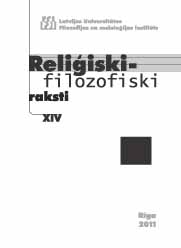Vēlīno stoiķu un budistu ētikas paralēles
Some Parallels Between the Ethics of Late Stoicism and Buddhism
Author(s): Arnis MazlovskisSubject(s): Philosophy
Published by: Latvijas Universitātes Filozofijas un socioloģijas institūts
Summary/Abstract: Having investigated the parallels between the ethical thought of the Late Stoicism and Buddhism, the author notices some far-reaching similarities between the two teachings, notwithstanding their geographical and cultural remoteness. The Stoics attempted to comply with the obtaining life-processes by cultivating amor fati – love of personal destiny. They relied on the cosmic order and desired nothing that was not „given”to them. On the bases of personal experience Buddha teaches, preaches and promulgates the truth, to the effect that all structures are weak (sabbe sankhārā aniccā), and subjected to suffering (dukkha) and are but transient combinations of elements (anattā). The soul, according to Buddhism, is not a spiritual substance, but a stream of psychic elements, undergoing constant flux of interrelations. For this reason the transmigration of souls (as such) is impossible. Schopenhauer, who was an adherent of Buddhist philosophy, proposed that such a transmigration should be termed polingenesis. Buddhism rejects the belief in the Creator of the world, because such a belief is incompatible with the existence of evil. There is no personal judge with powers of retribution for good and evil deeds. Justice in the world is provided by the law of kamma. In the manner of most of the other adherents of ancient religiousphilosophical teachings, both the Stoics and the Buddhists assume that the life of an individual is of cyclic character. The Stoics considered this life as a kind of prelude of the life- to- come. We get ready for the new life as from our birth unto death. All things are re-born after a certain period of time. Buddhists, in particular, believe in regular cyclic processes of appearance and disappearance of the cosmic systems. Every living creature is incessantly wandering in samsara untill it reaches total enlightenment – every death is followed by a new birth. Both teachings, due to their practically-orientated disposition, disregarded purely theoretical questions. Seneca held that the complexity of the world`s problems were beyond the reach of the human mind; the uprightness of character is of greater value than advanced education. Questions concerning the eternity and the finality of the world, the body-mind relationship, the personal identity of the re-born and the enlightened existence after death Buddha left unanswered. Even a person with scanty knowledge is worthy of praise, if he/she lives in consonance with dhamma. The Stoics relied on their own resources in reaching perfection; they considered it inapropriate to ask for the help of the gods. Buddha has voiced a similar thought – no prayer will free us from samsara. Even Buddha himself, according to the view of his followers, is inaccessible to prayers after entering into anupādisesa-parinbbānā (the termination of burdens).
Journal: Religiski-filozofiski raksti
- Issue Year: XIV/2011
- Issue No: 1
- Page Range: 55-76
- Page Count: 22
- Language: Latvian

